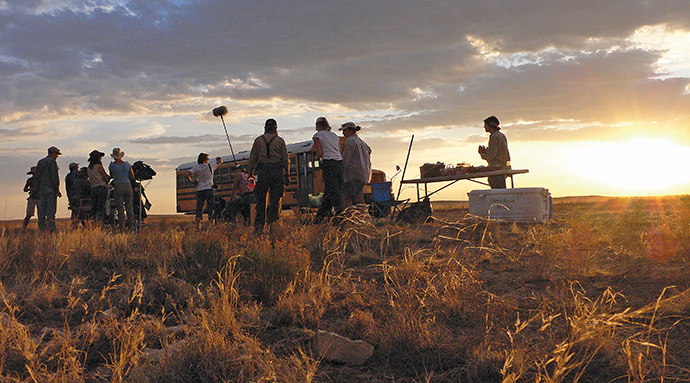No stranger to hosting film productions, New Mexico has landed a thriller.
Netflix in October announced plans to establish a production hub in Albuquerque, saying the incentivized deal with the city and state will generate $1 billion in production money over the next decade and add up to 1,000 production jobs a year.
The presence of the streaming entertainment colossus, with 130 million subscribers worldwide and growing ambitions to create its own content, is expected to create a ripple effect across New Mexico’s film industry.
"I assumed that after the announcement I’d get some calls," Nick Maniatis, director of the New Mexico Film Office, tells Site Selection, "but it’s been unbelievable. Shows that were on the fence are not on the fence any longer. They’re coming. People are saying, ‘We want to be there, too.’ "
The state’s film industry, says Maniatis, set successive records in 2015, 2016 and 2017, culminating with a half-billion-dollar spend last year.
Netflix has a history with the Land of Enchantment. The seeds were planted in 2015, with production of the Adam Sandler comedy, "The Ridiculous 6." Since then, Netflix has brought nine productions to the state, including the Emmy Award-winning limited series "Godless" and "Longmire."
"Our experience producing shows and films in New Mexico inspired us to jump at the chance to establish a new production hub here," said Ty Warren, Netflix’s vice president for physical production. "The people, the landscape and the facilities are all stellar. The combination of great crews, existing infrastructure, financial incentives — it was all part of it." Albuquerque, said Warren, will be the company’s "home away from home."
What got the ball rolling, as if by coincidence, was the availability of Albuquerque Studios, a 170,000-sq.-ft (15,794-sq.-m.) production facility with nine sound stages, around which Netflix will build its New Mexico hub. Despite having facilitated "Breaking Bad," "Better Call Saul" and a host of other high-profile productions, Albuquerque Studios has operated under capacity and has suffered from legal problems, including bankruptcy. Alicia Keyes, film liaison for the Albuquerque Film Office, tells Site Selection that she was mulling ways to better leverage the under-utilized facility when she happened to speak by phone last spring with a friend at Netflix.
"I was asking him," says Keyes, "about having to fly executives back and forth each week between L.A. and Albuquerque. "And I just said to him, ‘Why are you guys not buying Albuquerque Studios?’ "
Netflix was interested, says Keyes, but signaled that it wanted support from the city and state. Negotiations commenced in May, say officials, with New Mexico eventually extending $10 million in funding through the Local Economic Development Act (LEDA) and the city committing another $4.5 through LEDA. The sale price of Albuquerque Studios, reported to be in the range of $30 million, would not be confirmed by Netflix or the studio, both of which declined to comment for this report. Netflix will qualify for tax rebates of up to 30 percent as part of the New Mexico film incentive program, first instituted in 2003. Governor Susana Martinez, who had earlier sought to rein in the program, nonetheless hailed the deal.
Debra Inman, senior vice president for business development at Albuquerque Economic Development, Inc., emphasizes in an interview that the benefits will flow beyond the film industry.
"When you look at the fact that about 30 percent of all production spend is actually spent on local goods and services," Inman says, "then you are supporting a variety of your industry sectors. Hotels, restaurants, catering, lumber suppliers, paint stores, graphic designers, accountants, digital media firms, equipment rentals and sales, florists … it’s kind of unlimited when you think about the impact that it has on your local community."
Nevada Goes ‘Green’
Nevada’s new market for legal marijuana has had its own impact on state coffers. First-year tax collections, which ended in June, totaled $69.8 million — about 140 percent of the $50.3 million the state had predicted. State-licensed dispensaries and retail stores saw total taxable sales of $529.9 million, according to the State Department of Taxation, generating $42.5 million in tax receipts through the 10-percent Retail Marijuana Tax. The 15-percent Wholesale Marijuana Tax brought in close to $27.3 million, the Department says.
"We expect things to continue to improve in terms of numbers," Bill Anderson, director of the Taxation Department, tells Site Selection. "It’s a brand new industry that’s just getting off the ground. Chances are quite good that our 2019 collections will again exceed projections by a sizable amount."



The momentum is swinging in that direction. The last four months of the 2018 fiscal year (ending in June 2018) witnessed the largest sales of the year, and July set another record with $7.9 million in tax receipts. Meanwhile, the state is ramping up capacity. In December, says Anderson, Nevada will issue another 64 licenses for adult-use dispensaries, roughly doubling the current number. The initial round of approvals awarded licenses in five of the state’s 17 counties, with a heavy focus on southern Nevada, including Las Vegas.
"We’ll continue to see the industry spread to other counties," says Anderson. The cost of a retail license is $20,000.
Evergreen Organix, in Las Vegas, is the state’s biggest producer of edibles, including cookies, brownies, baked goods, cereal treats and gummies, all of which it sells to dispensaries, says Jillian Nelson, vice president of operations. The company operates a pharmaceutical grade laboratory where it extracts marijuana concentrates from plants it grows on site, and a kitchen that manufactures the edibles. Evergreen Organix, which has no retail operations, also sells "pre-roll" marijuana in bulk.
Nelson argues that state tax collections are based on an inflated assessment of the per-pound price of marijuana, and thus may render an exaggerated picture of actual sales.
"Sales," she says, "have done pretty well. Overall, as an industry I think they are a little bit above what the expectation was.
"I do think the state has done a very good job of regulating the industry," says Nelson, "especially if you look at the experience of some other states. Everything in this industry is kind of ‘fly by the seat of your pants’ in terms of regulation. Everything’s always changing, and our regulators have done a really good job of trying to understand the industry. They’re doing the best they can."
Infosys Taps Arizona
Infosys, the Indian technology services and consulting giant, will author the next chapter of its U.S. expansion with a technology and innovation hub that will train and employ more than 1,000 people at an unannounced site in Arizona, widely believed to be in the Greater Phoenix area. The company says its Arizona Technology and Innovation Hub will have a special focus on autonomous technologies, Internet of Things (IoT), full-stack engineering, data science and cybersecurity.
In May 2017, Infosys committed to opening at least four technology hubs across the U.S. and, in the process, to hire and train 10,000 American workers. To date, the company has opened hubs in Indianapolis, Indiana, and Raleigh, North Carolina, and has announced other hubs for Hartford, Connecticut, and Providence, Rhode Island. The company says it has already hired nearly 5,900 people.
“[Arizona] could be the IoT center of the United States and potentially the IoT center of the world.”
In its announcement, Infosys recognized Arizona’s broad talent pool as a factor in its decision. Addressing local economic leaders, Infosys President and COO Ravi Kumar also cited the state’s technology base.
"Arizona, as a state, has a great confluence of manufacturing, high tech and technology companies," Kumar said. "This could be the IoT center of the United States and potentially the IoT center of the world."
According to Sandra Watson, president and CEO of the Arizona Commerce authority, the decision by Infosys "further solidifies our state’s reputation as a tech industry leader. This operation will create a significant number of high-value jobs and focus on advancing emerging technologies."
Along with hiring new talent, Infosys will be "upskilling" local professionals through its talent training curriculum, operated in conjunction with local colleges and universities. Arizona State University in Tempe, which produced 23,000 graduates last year, has emerged as one of the country’s fastest-growing research institutes. In a 2017 interview with Site Selection, Kumar maintained that having access to centers of higher education is a key consideration in determining where to locate Infosys tech hubs.
"Our aim is creating the enablement and training infrastructure that will support this talent to enter the workplace," explained Kumar. "The first employees who have come on board are trained on university campuses with faculty from Infosys, sometimes combined with faculty from our university partners. The U.S. is a huge potential talent pool, which needs to be converted into an actual workforce."
Employment in Arizona’s technology industry expanded by an estimated 4,290 jobs in 2017, according to a report released in May by the Computing Technology Industry Association, (CompTIA). With 237,100 workers accounting for 7.8 percent of the state’s total workforce, Arizona ranks 18th among the 50 states in net tech employment, according to CompTIA’s report, "Cyberstates 2018." The report found that the tech industry contributed $28.5 billion to Arizona’s economy last year.
Since August, Arizona has experienced a bounty of tech companies announcing expansions. In addition to Infosys, they include:
- Acronis: A global leader in cyber protection, Acronis announced plans to double its investment in Arizona to $20 million and to created more than 100 new jobs in engineering and R&D.
- Airobotics: An Israeli automated drone startup that supports the mining industry, Airobotics launched its launched North American headquarters in Scottsdale, bringing 83 new jobs with it.
- Rogers Corporation: A global manufacturer of tech-focused materials, Rogers corporation announced plans to created 90 new jobs through an expansion of its manufacturing operations in Chandler.
- Cognizant: The IT services company based in Teaneck, New Jersey, celebrated the opening of its newest regional technology and service delivery center in Mesa, which will house more than 500 new tech workers.

